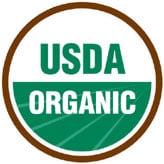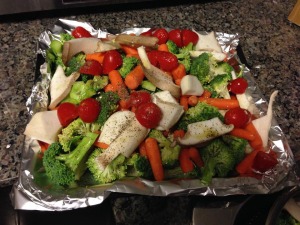A lot of people have asked me whether I buy everything organic and is it really that much better? What non-organic foods could I “get away” with? Well, I’ve done some research and put this post together for y’all!
What is Organic?
Organic foods are produced using methods of Organic Farming. Organic farming practices are designed to encourage soil and water conservation and reduce pollution. It excludes or strictly limits the use of various methods including synthetic pesticides, antibiotics, hormones, and genetically modified organisms (GMO). Organic agricultural methods are internationally regulated and legally enforced.
Why Organic?
Consuming organic foods is a good way to avoid agricultural chemicals and food additives including preservatives, artificial sweeteners, colorings and flavourings. The Earth and our bodies do not break down most of the chemicals used so they accumulate and last a long time, depleting important minerals in the soil such as selenium, chromium and iodine. Pesticides are also toxic to humans and can damage our body systems and expose us to bacteria and carcinogens (cancer causing). As mentioned above, Organic farming practices are designed to benefit the environment by reducing pollution and conserving water and soil quality. Purchasing organics supports our local farmers and our environment.
Why Not Organic?
The biggest deterrent to buying organic is the cost due to more expensive farming practices – but organics more nutritious, natural and whole, which fuels your body more efficiently and leaves you fuller. You get more bang for your buck with one organic apple as opposed to non-organic. Another potential con is, because organic fruits and vegetables aren’t treated with waxes or preservatives, they may spoil faster – but how is that a bad thing? Food with a long shelf life are typically not ideal for optimal nutrition. Non-organic foods generally look more cosmetically appealing than their organic counterparts, with the added wax and colourings. We can all appreciate the attractiveness of a big, bright and shiny red apple – but the less attractive organics tend to attract the insects and pests because mother nature knows where the nutrients lie – in the organic, more nutrient dense food!
That being said, it isn’t necessary, nor is it possible to buy and consume EVERYTHING organic. I don’t. There is so much information out there, different opinions and different types of bodies to fuel. It is up to you to take the information you have and take action on what you feel is right for your lifestyle.
Which Foods Are Most Important to Buy Organically Grown?: “The Dirty Dozen Plus.”
So there is the What could I get away with NOT organic? Each year the Environmental Working Group (EWG) releases its annual dirty dozen list — a list of foods that you should always, whenever possible, buy organic. The group analyzes data about pesticide residue and ranks foods based on how much or little pesticide residue they have. Some crops are more heavily treated than others. The group has estimated that individuals can reduce their exposure by 80% if they switch to organic when buying those 12 foods. I’ve also added to the list based on my further readings.
Listed from worst to best
(lower numbers = more pesticides)

- Apples
- Strawberries
- Grapes
- Celery
- Peaches
- Spinach
- Sweet Bell Peppers
- Nectarines – imported
- Cucumbers
- Cherry Tomatoes
- Snap Peas – imported
- Potatoes
In addition(in not particular order)
- Baby Food
- Milk and Butter
- Bananas
- Leafy Greens
- Green Beans
- Rice
- Corn Products
- Eggs (aim for free run, not caged hens)
- Wheat
- Cruciferous Vegetables (broccoli, Cabbage, Brussel Sprouts, Cauliflower)
- Seafood (aim for wild, ocean fish)
- Meat (aim for grass fed, no hormones or antibiotics)
- Coffee (aim for organic fair trade. I don’t drink coffee at all but I did try some in Costa Rica where the beans were grown in a plantation and the coffee was crushed and filtered through a cloth filter rather than paper. It was DELICIOUS)
- Wine (aim for organic, sulfite-free wines)
I know – the list is basically everything we know, right? Don’t lose sleep over it. Just be aware and try your best to at least stick to the dirty dozen organics. The added items are of concern due to factory farming practices, heavily treated fields, water pollution, and some foods absorb and retain more residue than others.
Check the Label
There are a number of certification bodies providing organic certification services in Canada and the US such as the Atlantic Certified Organic Co-operative limited (ACO) and The U.S. Department of Agriculture (USDA). These standards regulate how such foods are grown, handled and processed. Now, if you really want to go all the way – be weary of the “organic” white flour or “organic” cane sugars etc. If the label does not say UNREFINED, it is likely refined, which means the food has been stripped of its good stuff: like the FIBRE. You’ve seen bran and wheat germ sold separately? That’s what is typically stripped form our white and brown rice, etc. In short, UNREFINED = PROCESSED. Again, something to think about and be aware of.
Ways to Minimize Pesticides in Your Food
- Limit use of out-of-season, imported produce
- Wash, soak, and peal (I like to wash my vegetables with some sea salt and fresh lemon juice. Vinegar is another option)
- Limit intake of red meat and factory-farmed poultry
- Limit intake of fish known to be caught from polluted waters
- Replace some meat meals with other proteins such as legumes, whole-grain rice, soy products
- Buy some bulk foods such as beans, oats, and unrefined grains such as millet, barley, spelt, quinoa (although quinoa is considered a seed)
- Substitute one good fresh food for another – from the EWG list!
Where to find Organics?
Local farmers markets are a great place to start. With locally grown, fresh from the farms produce, you can be confident that the foods didn’t have to travel far to get into your hands. I also like the organic section at Loblaws Superstores. My favourite health food stores are Ambrosia and The Big Carrot here in Toronto. If you are in the States, Trader Joe’s is also AMAZING and has super competitive prices.
I hope this helps! As always, please leave a comment or send me an email with any feedback, questions or suggestions for future posts! Please forward along to any friends and family who you think could benefit from this information! Xo
References:
http://www.goodhousekeeping.com/recipes/healthy/dirty-dozen-foods#slide-1
http://www.ewg.org/foodnews/index.php
Book: Staying Healthy with Nutrition by Elson M. Haas


